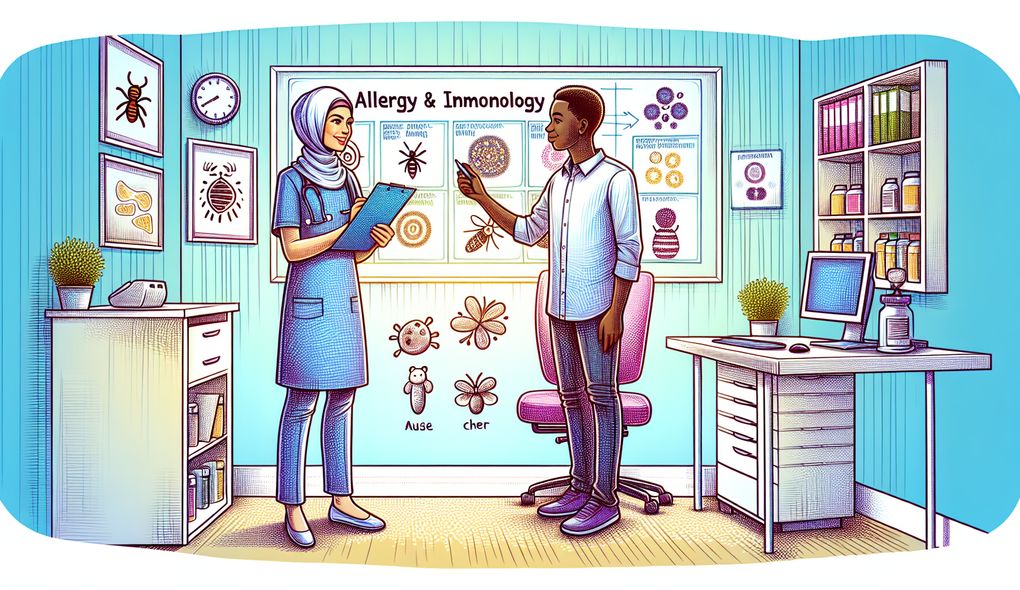What is your preferred method of communication with patients and their families? How do you ensure effective education and understanding of allergic and immunologic disorders?
INTERMEDIATE LEVEL

Sample answer to the question:
My preferred method of communication with patients and their families is through face-to-face interactions. I believe that personal communication allows for better understanding and helps build trust between healthcare providers and patients. During these interactions, I ensure effective education and understanding of allergic and immunologic disorders by using simple language that is easy to understand. I provide patients and their families with educational materials and resources that they can refer to at home. Additionally, I encourage them to ask questions and address any concerns they may have.
Here is a more solid answer:
In my role as an Allergy and Immunology Nurse Practitioner, I have developed strong communication and education skills to effectively communicate with patients and their families. I understand the importance of clear and concise communication when discussing allergic and immunologic disorders. I prefer to communicate directly with patients and their families through face-to-face interactions, as it allows for better engagement and understanding. During these interactions, I use simple language and avoid medical jargon to ensure that patients and their families fully comprehend the information being provided. I also provide educational materials and resources that they can refer to at home to reinforce their understanding. Additionally, I actively encourage patients and their families to ask questions and address any concerns they may have, as their active involvement in their healthcare journey is crucial. By adopting these methods, I have been able to establish strong relationships with patients and their families, ensuring effective education and understanding of allergic and immunologic disorders.
Why is this a more solid answer?
The solid answer expands on the basic answer by providing specific details and examples of the candidate's skills and abilities in the evaluation areas. It demonstrates their strong communication and education skills, as well as their ability to engage with patients and their families in a meaningful way. The answer also emphasizes the importance of clear communication and active involvement of patients and their families in their healthcare journey. However, it could benefit from more specific examples or anecdotes to further showcase the candidate's experience and expertise.
An example of a exceptional answer:
I believe that effective communication is the cornerstone of delivering high-quality care to patients with allergic and immunologic disorders. My preferred method of communication with patients and their families is through a holistic approach that includes face-to-face interactions, written materials, and digital resources. When meeting with patients and their families, I take the time to listen actively and address their concerns with empathy and respect. I tailor my communication style to suit their individual needs and preferences, whether that be using visual aids, providing translated materials, or utilizing technology for remote consultations. To ensure effective education and understanding, I use evidence-based resources and explain complex medical concepts in an accessible manner. I encourage patients and their families to actively participate in the decision-making process, empowering them to take ownership of their healthcare journey. Additionally, I regularly attend conferences and engage in continuous professional development to stay up-to-date with the latest advancements in the field. By consistently refining my communication and education skills, I strive to deliver comprehensive care and foster long-term relationships built on trust and collaboration.
Why is this an exceptional answer?
The exceptional answer goes above and beyond by presenting a holistic approach to communication with patients and their families. It demonstrates the candidate's empathy, adaptability, and commitment to patient-centered care. The answer highlights the candidate's use of various communication methods and resources to cater to different patient needs and preferences. It also emphasizes the candidate's dedication to continuous professional development, showcasing their commitment to staying updated with the latest advancements in the field. Overall, the exceptional answer presents a comprehensive and patient-centered approach to communication and education.
How to prepare for this question:
- Familiarize yourself with common allergic and immunologic disorders, their causes, symptoms, and treatments. Stay up-to-date with the latest research and advancements in the field.
- Develop strong communication and active listening skills. Practice explaining complex medical concepts in simple terms.
- Learn about different communication methods and resources, such as visual aids, translated materials, and digital platforms, that can enhance patient understanding.
- Consider the needs and preferences of patients and their families when communicating. Tailor your approach to accommodate diverse cultural backgrounds and language barriers.
- Highlight your commitment to continuous professional development and staying updated with advancements in the field.
- Utilize mock interviews or role-playing exercises to practice your communication skills and articulate your preferred method of communication with patients and their families.
What are interviewers evaluating with this question?
- Clinical skills
- Patient assessment and diagnostic abilities
- Communication and education skills
- Collaboration
- Continuous professional development

